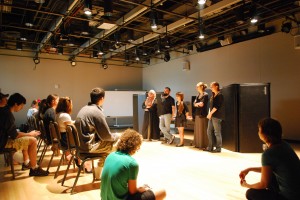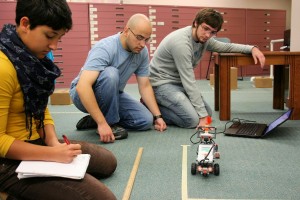Honors College students take at least six honors courses to complete their Honors College Certificate, taught by faculty across the disciplines at UMBC. Whether they are “Honors sections” (enhanced versions of existing courses) or stand-alone Honors seminars, these courses give Honors students the opportunity to work closely with professors.
 Honors Seminars
Honors Seminars
Honors seminars are an essential part of a challenging Honors curriculum: they give students a small-class setting in which to work closely with faculty members on current research problems, and introduce them to the rewards of work in different disciplines. In turn, Honors seminars provide faculty with the chance to explore new topics and to experiment with innovative teaching methods, while helping students develop critical thinking skills.
Listed here are a sample of recently offered Honors Seminars:
HONR 200: Ethics and Public Policy
In this course we examine some of the moral issues that arise in public life. The course begins by reviewing frameworks for thinking about ethical issues in public policy, and then deals with questions concerning the means employed to implement public policy, questions concerning the ends policy should serve, and questions concerning the appropriate roles of public officials. Readings include classics of political and moral philosophy, case studies and some contemporary journalism. Issues may include the official use of violence, terrorism, toleration and its limits, deception and politics, multiculturalism, capital punishment, abortion, welfare, health care, affirmative action, and perhaps others. Short presentations will be required, participation will be emphasized, and students will write several short papers.
HONR 200: Being Human: The Brain, The Mind, & Pieces of You
Few of us take time to observe our thinking mind in action — How does it work? What does it do? What are the implications? We will explore these questions, drawing from knowledge developed in philosophy, neurology, evolutionary biology, religion, psychology, medicine, pedagogy, anthropology, literature, quantum physics, and physiology. Simultaneously, students will explore the nature of their own minds using a range of techniques including meditation, supplementing the course material with direct experience. In addition to weekly assignments, students will design a research experiment to test a student developed hypothesis related to the course material.
HONR 210: Great Books Seminar I: Narrative, Dramatic and Visual Traditions
An introduction to the great books of world literature, religion, philosophy, history, and science from ancient times to the present day. This course will include readings from such works as Genesis, Ramayana, several Greek tragedies, Aristotle’s Poetics, Vergil’s Aeneid, Ovid’s Metamorphoses, and the Arabian Nights.
 HONR 300: Robots and Society
HONR 300: Robots and Society
Robots are becoming an increasingly ubiquitous part of modern society, though ideas about robots date back to at least the era of da Vinci. The objective of this course is to introduce students to concepts related to the use of robots in society. We will delve in technical, ethical, legal and creative ideas surrounding the increasing role of robots in our lives. Students will try their hands at building an extremely simple robot to help them understand some of the realities of robotics and dispel certain misconceptions about how robots make decisions and act on those decisions.
HONR 300: Race, Science, and Society
This course examines the practice and process of science through a cultural lens informed by the attitudes, values, and traditions that characterize American society. We will engage an historical analysis of issues that emerge when “race” converges (and conflicts) with “science.
HONR 300: A History of Kermit
This seminar will examine puppetry as a surprisingly powerful, ubiquitous craft that is reaching beyond the arts into fields like anthropology and robotics. We will study puppetry both as a vibrant performing art form, and as a means to think creatively about how seemingly unrelated fields connect. While class time will chiefly consist of group discussions in response to readings and assigned film viewings, several class sessions will include time for in-class writing and working with puppets.
HONR 300: Race, Poverty, and Gender in Baltimore
Social categories of race, class and gender provide structure for and organize people’s lives. These categories intersect with one another, reinforce one another’s effects, and can, at the same time, cut against one another. In this course, we will explore how these main social categories operate in the lives of people living (or who lived) in Baltimore. We will first explore how race, class, poverty and gender are defined and then examine how they operate and interact within the context of Baltimore. As any city with a unique history, Baltimore provides a location through which we can examine social phenomena like block busting (neighborhood segregation), health disparities, food access, proliferation of crime and drugs, the judicial system, and more. We will also partner with some Baltimore-based non-profits throughout the course. Some short papers and a longer final presentation/paper that incorporates the partnership work will be required.
HONR 300: Animal Reproduction
The birds and the bees: a comparative look at reproductive physiology, ecology and behavior across the animal kingdom. Because the ability to reproduce is a defining characteristic of life, reproduction is of central importance in the study of biology. Here, we survey animal reproduction with an evolutionist’s eye; why do females choose while males display, why are dragonfly penises covered in spines, why do most animals have two sexes rather than three, ten, or none at all? What is a sex, anyway? In suggesting possible answers to these questions, we’ll explore the meaning, importance, and fantastic variety of reproduction.
 Honors Courses
Honors Courses
Honors (H) sections are enriched versions of regular classes that allow an instructor and the student to explore course issues in greater depth. H-sections may involve different readings and assignments, field trips, more advanced laboratory work, or extra language work, and typically involve an extra hour or two of small-group meetings with the instructor. For many Honors College students, H-sections will also fulfill their major, minor, or General Education Program requirements.
Listed here are a sample of the regularly offered H-sections:
BIOLOGY 141H: Foundations of Biology-Cells, Energy, and Organisms
CHEMISTRY 101H: Principles of Chemistry I
DANCE 202H: Dance History II
ENGINEERING 101H: Introductory Engineering Science
ENGLISH 100H: Composition
HISTORY 110H: Western Civilization to 1700
MATH 151H: Calculus
PHYSICS 121H: Introductory Physics
GENDER AND WOMEN’S STUDIES 100H: Introduction to Gender and Women’s Studies
SOCIAL WORK 200H: Social Issues-Social Action
 Honors Seminars
Honors Seminars HONR 300: Robots and Society
HONR 300: Robots and Society Honors Courses
Honors Courses

